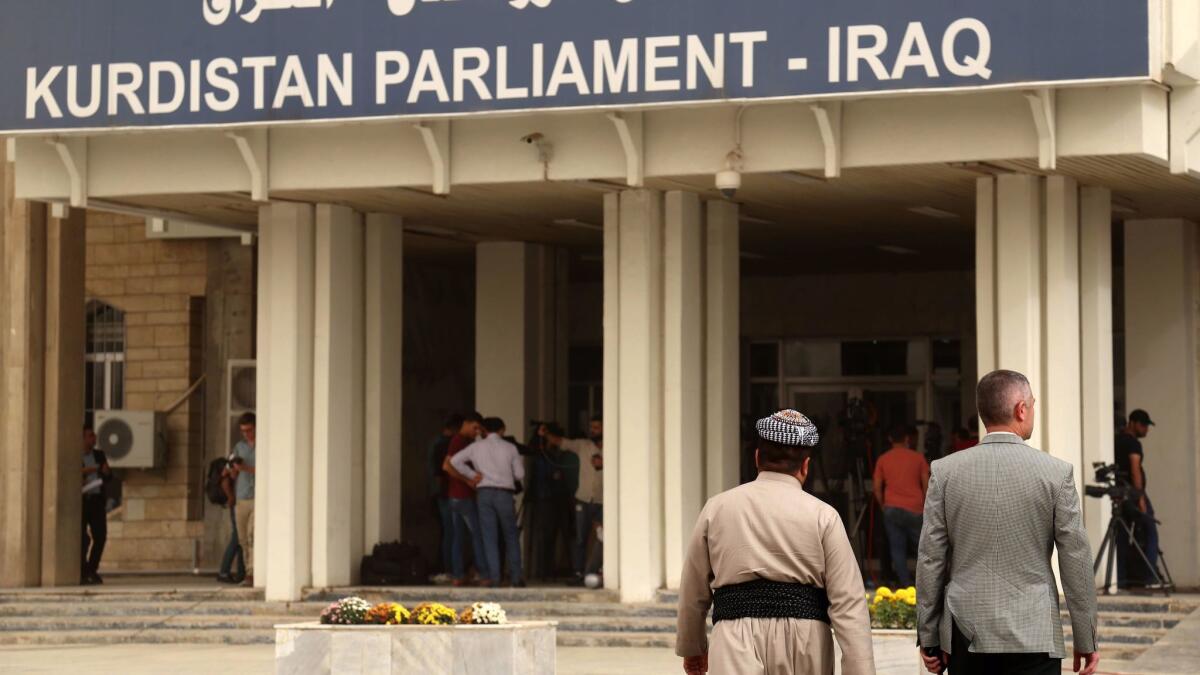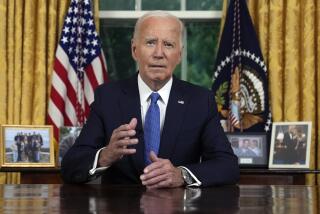President of Iraq’s Kurdish region resigns, leaving many questions in his wake
- Share via
Reporting from Beirut — An independence referendum held by Iraq’s Kurds last month was supposed to reinvigorate the long-held dream of an independent Kurdistan. Instead, it reversed — perhaps irrevocably — their aspirations for statehood.
It was a gamble on which 71-year-old Massoud Barzani, the veteran Kurdish leader and one-time guerrilla fighter, had staked his political career.
On Sunday, weeks after it was clear that he had lost the bet, Barzani stepped down as president of the Kurdish semiautonomous region of Iraq, leaving the Kurds with no credible successor even as bickering parliamentary factions struggled to apportion his powers.
In his first public appearance since September’s referendum, Barzani addressed the region’s parliament, saying he “refuse[d] to continue” in his post as president after his term expires on Nov. 1, the date also set for the now-postponed presidential and legislative elections in the region.
He added that the presidential law of the region should not be amended nor should the term of the presidency be extended.
“You should therefore meet at your earliest convenience to ensure there is no legal vacuum in the execution of the duties and powers of the president of the region,” said Barzani in a letter he submitted to parliament before his address, according to a copy released online.
The move effectively suspends the presidency, a post that Barzani had held for 12 years (his second five-year term, which ended in 2015, was extended for two years), while calling for its powers to be distributed among the three branches of government.
Barzani insisted, however, that he would remain as a peshmerga, a reference to the Kurdish region’s fighting force, so as to “achieve the just rights” and “achievements of our nation.”
The televised speech marked a melancholic denouement for the Kurdish leader, weeks after he defied international and regional opposition to an independence poll held in Kurdish-majority provinces as well as in territories in dispute between Baghdad and Irbil, the capital of the Kurdish region.

The referendum, which garnered a 92.7% vote in favor of separation, was meant to advance the prospects of Kurdistan, the long-held dream of an independent Kurdish state on territories covering segments of northern Iraq.
But in the wake of the plebiscite, the Iraqi government diverted its forces from fighting Islamic State to seize control over the disputed areas, including Kirkuk, the multi-ethnic northern Iraqi province whose oil riches and bickering sects have made it a perennial tinderbox between Baghdad and the Kurds.
It was taken this month after members of the Patriotic Union of Kurdistan, the region’s top opposition party, forged an Iranian-brokered deal with Baghdad to withdraw from the province while Iraqi troops moved forward to take their positions.
That agreement, Barzani said on Sunday, was nothing less than a “stab in the back” that undermined the entire region.
In the days to come, other losses followed: The Kurdish region’s oil revenues were effectively halved. Its borders with Turkey and Iran, the Kurds’ top trading partners, were also seized.
It was a tarnishing of Barzani’s legacy, many said.
“We were enjoying lots of powers that were sovereign powers, like having control over border crossings, control over the airport and we had our direct diplomacy with the international community…. We were a state within a state,” said Kamal Chomani, a nonresident fellow at the Tahrir Institute for Middle East Policy, in a phone interview Sunday.
“We lost everything because of Barzani’s miscalculation and personal ambitions, so his stepping down is a positive thing for the region.”
Local news outlets reported his supporters, many armed with sticks, broke into the parliament to insist that he remain in power. They also attacked an opposition member of parliament who had criticized Barzani, according to the Alsumaria news channel.
Yet it is unclear if Sunday was the final curtain for Barzani, an ardent Kurdish nationalist since the age of 16 who took up the mantle of his father, the Kurdish leader Mustafa Barzani, after his death in 1979.
Barzani’s family continues to play an outsized role in the region’s political hierarchy. His nephew Nechirvan Barzani serves as the region’s prime minister, and his son Masrour heads its security apparatus.
And the suspension of the presidency, said Zaid Ali, author of “The Struggle for Iraq’s Future,” has created an impossible task for Kurdish lawmakers.
“Barzani is saying he doesn’t want the presidency to exist anymore, and to create a new constitutional arrangement in a few days — that’s actually a lot of work,” Ali said in a phone interview.
Though it could serve as a way to keep Barzani in power for an interim period, Ali continued, it could also lead to the fracturing of the Kurdish region along the fault lines of the two major Kurdish parties’ spheres of control.
“It won’t go smoothly, and it may lead to both sides stopping working with each other,” he said.
ALSO
Iraqi Prime Minister Haider Abadi faces big obstacles on road to rebuild war-torn nation
A trip through horror, confusion and contradictions in Syria
Bulos is a special correspondent.
Twitter: @nabihbulos
More to Read
Sign up for Essential California
The most important California stories and recommendations in your inbox every morning.
You may occasionally receive promotional content from the Los Angeles Times.











